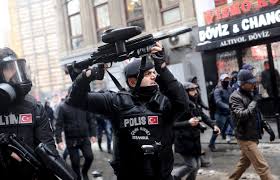歐洲板塊
Charlemagne
查理曼專欄
The other villain
另一個反派
Fethullah Gulen shares blame for the state of Turkey today
對于時下土耳其局勢,法土拉·葛蘭難辭其咎
You might think that by now Turkey had run out of handcuffs. But although the wave of arrests related to the bizarre coup attempt that rocked the country in the summer of 2016 has certainly slowed, it has not stopped. Every week seems to bring a new round-up of suspected members of the Gulen community, or cemaat, the Islamist movement that President Recep Tayyip Erdogan blames for the coup. At least 41 people, many of them soldiers, were detained on July 27th. Warrants for over two dozen others were issued last week.
你可能會認為土耳其的手銬此刻已經用完了。土耳其在2016年夏季爆發了一場震驚全國的詭異政變,盡管與此有關的逮捕浪潮確實有所放緩,但并沒有停止。土耳其政府似乎每周都會逮捕新一輪的葛蘭社群疑似成員,總統雷杰普·塔伊普·埃爾多安將這次政變歸咎于伊斯蘭運動。7月27日,至少有41人被拘留,其中許多是士兵。上周土耳其政府又簽發了20多份搜查令。

Nearly 600,000 people, most of them suspected Gulenists, have been investigated since the coup; nearly 100,000 have been arrested.Most had only tenuous links to the movement, such as having an account at a Gulenist bank. Some appear to have been tortured in captivity. But while there is sympathy among Turks for individual victims of Mr Erdogan’s purges, there is practically none for the cemaat as a whole, and even less for its leader, Fethullah Gulen, an ageing imam living in exile in Pennsylvania. Ask almost anyone in Turkey, including Mr Erdogan’s most bitter foes, and you will hear that compared with Mr Gulen, Turkey’s leader is the lesser of two evils. Mr Erdogan is an autocrat and a bully. But no one helped him cripple Turkey’s democracy more than Mr Gulen and his sect.
自政變以來,近60萬人接受調查,其中大部分為疑似葛蘭主義者;近10萬人被逮捕。大多數人與葛蘭運動只有微弱的聯系,比如說在一家葛蘭派的銀行有賬戶。有些人似乎在囚禁中受到酷刑折磨。但是盡管土耳其人會對埃爾多安總統清洗活動的個別受害者抱有同情,但他們實際上并不同情整個葛蘭社群,對于葛蘭派的領導人法土拉·葛蘭,一位流亡賓夕法尼亞州的年長伊瑪目,更是如此。問一下幾乎土耳其的所有人,包括埃爾多安總統最大的敵人,他們都會告訴你,兩害取其輕,土耳其的領導人要強過葛蘭。埃爾多安總統是一位獨裁者,也是一位惡霸。但是葛蘭及其教派最能削弱土耳其的民主,無人出其右。
The movement is a tough nut to crack. From the 1970s onwards, it attracted hundreds of thousands of followers, drawn mostly from among the poor and devout students who gravitated to its prep schools and dorms. After the end of the cold war, it began to market itself as the torchbearer of an enlightened Islam, setting up foundations abroad and winning a circle of Western well-wishers. But it was only when Mr Erdogan and his Justice and Development party came to power in 2002 that it started to flourish. Its sympathisers had previously trickled into Turkey’s bureaucracy. With Mr Erdogan’s encouragement, they took over entire institutions. (By one estimate, Gulenists held 30% of top jobs in the judiciary and 50% in the police.) With his approval, they orchestrated the arrests of thousands of Kurdish activists, army officers, secular types and journalists. “The Gulenists played a decisive role in enabling Erdogan to consolidate power,” says Gareth Jenkins, a security analyst.
葛蘭運動是個棘手的難題。從20世紀70年代開始,它吸引了成千上萬的信眾,其中大多數是窮苦和虔誠的學生,他們會被吸引到葛蘭派的預科學校和宿舍。冷戰結束后,它將自己推銷成指引伊斯蘭教前行的火炬手,在國外設立基金會,并贏得了一大批西方祝福者的青睞。但直到埃爾多安總統和他的正義與發展黨在2020年上臺后,葛蘭派才開始蓬勃發展。其支持者此前已經逐步進入土耳其的官僚機構。在埃爾多安總統的鼓勵下,他們接管了整個官僚機構。(據估計,葛蘭主義者接管了司法部門30%的高層職位以及50%的警察部門職位。)在埃爾多安總統的批準下,他們策劃逮捕了數千名庫爾德活動人士、軍官、世俗人士和記者。“古倫派在幫助埃爾多安鞏固權力方面發揮了決定性作用,”安全分析師加雷思·詹金斯說。
譯文由可可原創,僅供學習交流使用,未經許可請勿轉載。












